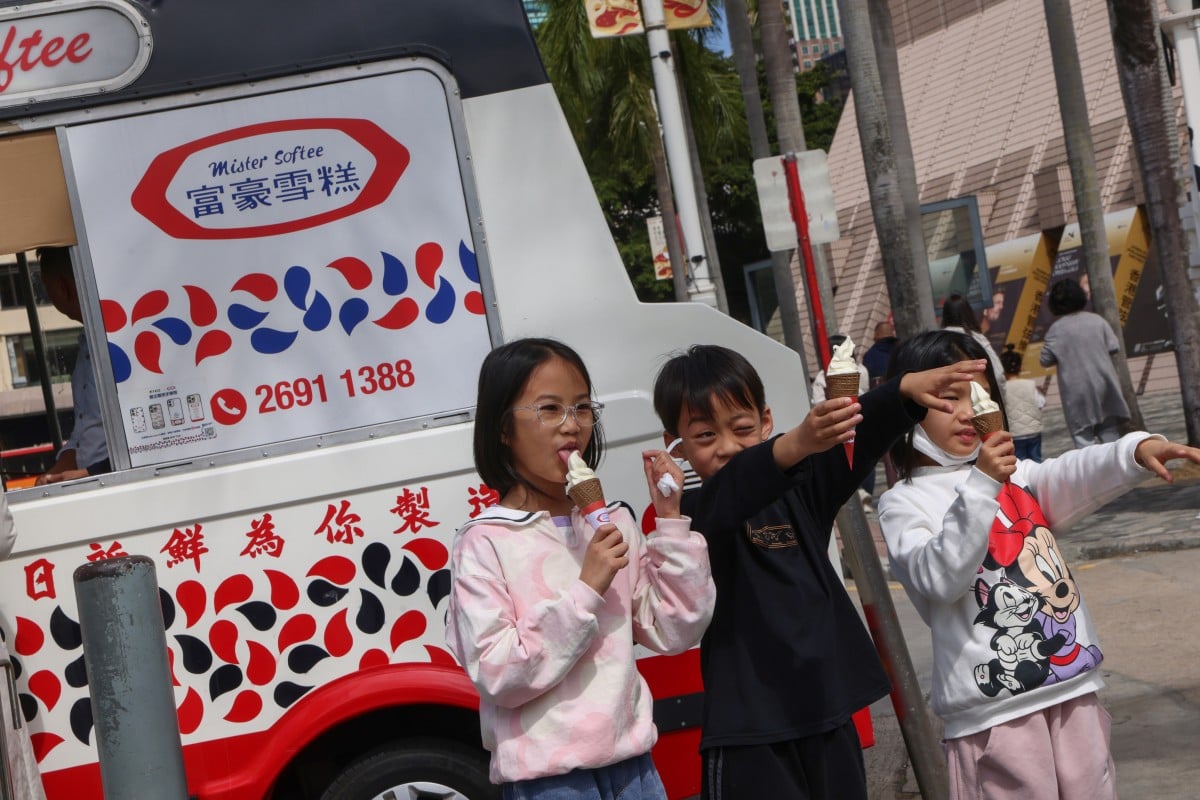 Ho King-yuen, who introduced Hong Kong’s iconic ice cream vans, passes away aged 98, leaving sweet memories and a beloved legacy for generations. Photo: Jelly Tse
Ho King-yuen, who introduced Hong Kong’s iconic ice cream vans, passes away aged 98, leaving sweet memories and a beloved legacy for generations. Photo: Jelly TseHo King-yuen, a beloved figure in Hong Kong, has died at the age of 98. He brought the city its very first ice cream van, delighting countless residents and visitors with sweet treats over the years.
Ho and two friends introduced the first Mister Softee ice cream truck to Hong Kong in 1970, and the vehicles have since become a beloved staple and popular tourist attraction.
More than 20 people queued at one of the ice cream vans on Tuesday afternoon under the Hong Kong Observation Wheel. Most were tourists who had heard about the trucks on mainland Chinese social media platforms, while some residents described the vans as being part of their “childhood memories”.
“With his experience at Dairy Farm, he imported the first soft ice cream van to Hong Kong from overseas with his friends and founded Mister Softee [here], which brought many precious sweet memories to many generations of Hongkongers and has become a renowned brand in the city,” an obituary published in a local newspaper on Tuesday said.
“He retired at an old age and transferred the business to another company. He then moved to Perth in Western Australia with his family.”
Ice cream that doesn’t melt? New discovery means scientists are one step closer
How Mister Softee came to Hong Kong
Mister Softee was founded by William and James Conway in 1956 in Philadelphia. It is one of the largest franchisers of soft ice cream in the United States.
According to media reports, Ho and two other people bought the franchise rights after seeing a park filled with ice cream trucks during a visit to the United Kingdom.
The first Mister Softee truck in Hong Kong opened in a football field in Tsuen Wan with a cup of ice cream costing 50 HK cents, with the business making HK$800 within an hour.
In 2010, the American company reclaimed the franchise rights and the English name of the Hong Kong brand was changed to Mobile Softee.
Memories for locals and tourists alike
The ice cream vans are famous for playing “The Blue Danube” on repeat and have become a well-known staple in Hong Kong.
The white trucks with their red and blue pattern are also popular photo spots for mainland Chinese tourists.
On a Chinese social media platform, there are more than 10,000 posts discussing where to find the mobile truck, why it is popular and how the ice cream tastes.
Many tourists consider encountering the mobile truck a lucky experience, as it operates without a fixed schedule or location.
“I consider it a lucky day whenever I come across a Mobile Softee truck. It is a well-deserved reward after walking thousands of steps around the city,” one mainland social media user said.
Ice cream chain Baskin-Robbins launches AI lab to develop ‘innovative’ varieties
In tourist spots such as the Hong Kong Observation Wheel and Tsim Sha Tsui, where the truck frequently stops, its catchy music often acts as a cue for customers to form long queues.
“You can only find this ice cream in Hong Kong and it really showcases the authentic vibe of the city,” said Lili Li, an 18-year-old student who was queuing for ice cream in Central on Tuesday afternoon.
She was visiting the city for the first time with two friends from Xiamen.
Princess Chung, a 30-year-old resident who works in retail, joined the line with two friends before heading to a nearby event.
“When we were kids, we knew the ice cream van was coming when we heard its unique catchy music. I don’t know why they stopped playing it,” said Chung, adding she learned about the Ho’s passing from the media.
Ho King-yuen’s life
According to the obituary, Ho died on January 23 in Perth, Australia, and was survived by his wife, children and grandchildren. He was buried in Karrakatta Cemetery on Saturday last week.
Ho lost his father during World War II and dropped out of school at a young age. The oldest among his siblings, Ho had to take on the responsibility of being the carer for his younger brothers and sisters and worked several jobs to support them.
He later took up a major position at Dairy Farm – later rebranded as DFI Retail Group – while working a part-time job at the Hong Kong Jockey Club. He also became an auxiliary police officer and rose to the rank of inspector.
His elder daughter is a practising lawyer and his second son is an engineer.
According to the obituary, Ho had learned martial arts when he was young. He also loved Cantonese opera, Chinese literature and poetry, and could recite many famous works.
“Ho was always keen to help others and eager to help people to achieve their goals. He was a well-regarded man. He helped many of his colleagues and helped them to settle down in Australia,” the obituary read.
